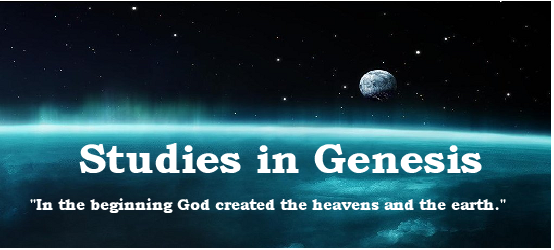|
A Study of the Book of Genesis
Introduction To Genesis
The book of Genesis is a book of beginnings
It is probably the most important book ever written.
The Book of Genesis gives vital information concerning the origin of all things.
Therefore, it gives the meaning of all things
The word genesis means "origin."
The Book of Genesis gives the only true and reliable account of the origin of all the basic entities
of the universe and of life.
(1) Origin of the universe
Only the Book of Genesis accounts for the actual creation of the basic-mass-time continuum
which constitutes our physical universe.
Genesis 1:1 is unique in all literature, science, and philosophy.
Every other system of cosmogony, whether in ancient religious myths or modern scientific models,
starts with eternal matter or energy in some form, from which other entities were supposedly
gradually derived by some process.
Only the Book of Genesis even attempts to account for the ultimate origin of matter, space, and time;
and it does so uniquely in terms of special creation.
(2) Origin of order and complexity
Man's universal observation, both in his personal experience and in his formal study of physical
and biological systems, is that orderly and complex things tend naturally to decay
into disorder and simplicity.
Order and complexity never arise spontaneously -- they're always generated
by a prior cause programmed to produce such order.
The Creator's program purposes are found only in Genesis.
(3) Origin of the solar system
The earth, as well as the sun and moon, and even the planets and all the stars of heaven,
are brought into existence by the Creator, as told in Genesis.
(4) Origin of the atmosphere and hydrosphere
The earth is uniquely equipped with a great body of liquid water and an extensive blanket
of and oxygen-nitrogen gaseous mixture, both of which are necessary for life.
These have never "developed" on other planets.
They are accounted for only by special creation.
(5) Origin of life
How living systems could have come into being from non--living chemicals is, and will undoubtedly
continue to be, a total mystery to materialistic philosophers.
The marvels of the reproductive process, and the almost-infinite complexity programmed
into the genetic systems of plants and animals, are inexplicable except by special creation,
at least if the laws of thermodynamics and probability mean anything at all.
The account of the creation of "living creatures" in Genesis is the only rational explanation.
(6) Origin of man
Man is the most highly organized and complex entity in the universe, so far as we know,
possessing not only an innumerable intricate physico-chemical structures,
and the marvelous capacities of life and reproduction.
But also possess a nature which contemplates the abstract entities of beauty and love
and worship, and which is capable of philosophizing about its own meaning.
Man's imaginary evolutionary dissent from animal ancestors is altogether illusory.
The true record of his origin is given only in Genesis.
(7) Origin of marriage
The remarkably universal and stable institution of marriage and the home, in a monogamous,
patriarchal social culture is also described in Genesis as being ordained by the Creator.
Polygamy, infanticide, matriarchy, promiscuity, divorce, abortion, homosexuality,
and all other corruptions develop later.
(8) Origin of evil
Cause-and-effect reasoning accounts for the origin of the concepts of goodness, truth,
beauty, love, and such things as fundamental attributes of the Creator Himself.
The origin of physical and moral evils in the universe is explained in Genesis
as a temporary intrusion into God's perfect world.
This was allowed by Him as a concession to the principal of human freedom and responsibility,
and also to manifest Himself as Redeemer as well as Creator.
(9) Origin of language
The gulf between the chatterings of animals and the intelligent, abstract,
symbolic communication systems of man is completely unbridgeable by any evolutionary process.
The Book of Genesis not only accounts for the origin of language in general,
but also for various national languages in particular.
(10) Origin of government
The development of organized systems of human government is described in Genesis,
with man responsible not only for his own actions, but also for the maintenance
of orderly social structures through systems of laws and punishments.
(11) Origin of culture
The Book of Genesis also describes the beginning of the main entities which we now associate
with civilized cultures -- such as urbanization, metallurgy, music, agriculture, animal husbandry,
writing, education, navigation, textiles, and ceramics.
(12) Origin of nations
All scholars today accept the essential unity of the human race.
The problem, then, is how distinct nations and races could develop if all men originally
were of one race and one language.
Only the Book of Genesis gives an adequate answer.
(13) Origin of religion
There are many different religions among men, but all share the consciousness that
there must be some ultimate truth and meaning toward which men should strive.
Many religions take the form of an organized system of worship and conduct.
The origin of this unique characteristic of man's consciousness, as well as the origin
of true worship of the true God, is given in Genesis.
(14) Origin of the chosen people
The enigma of the Israelites -- the unique nation that was without a homeland for 1900 years,
which gave to the world the Bible and the knowledge of the true God,
through which Christianity came, and which yet rejects Christianity.
It is a nation which has contributed signally to the world's art, music, science,
finance, and other products of the human mind, and which is nevertheless despised
by great numbers of people -- is answered only in terms of the unique origin of Israel
as set forth in the Book of Genesis.
So in reality, the Book of Genesis is the foundation of all true history,
as well as of true science and true philosophy.
It is above all else the foundation of God's revelation, as given in the Bible.
No other book of the Bible is quoted as copiously or referred to so frequently,
in other books of the Bible, as is Genesis.
For example, in the Old Testament, Adam is mentioned by name in the Books of Deuteronomy,
Job, and 1 Chronicles.
Noah is mentioned in 1 Chronicles, Isaiah, and Ezekiel.
Abraham is mentioned by name in 15 books of the Old Testament and 11 of the New Testament.
Jacob is named in 20 books (other than Genesis) of the Old Testament,
and in at least 17 of the New Testament.
In a special sense, every mention of the people or nation of Israel is an implicit acknowledgment
of the foundational authority of Genesis, since Israel was the new name given to Jacob,
and his sons who became the 12 tribes of Israel.
Apart from the Book of Genesis, there is no explanation for Israel,
nor consequently for all the rest of the Old Testament.
The New Testament is, if anything, even more dependent on Genesis than the Old Testament.
There are at least 165 passages in Genesis that are either directly quoted
or clearly referred to in the New Testament.
The portion of Genesis which has been the object of the greatest attacks of skepticism
and unbelief is the first 11 chapters, and is the portion which had the greatest influence
on the New Testament.
Yet there exists over 100 quotations or direct references to Genesis 1-11 in the New Testament.
Also, every one of these 11 chapters is alluded to somewhere in the New Testament,
and every one of the New Testament authors refers somewhere in his writings to Genesis 1-11.
On at least six different occasions, Jesus Christ Himself quoted from or referred to something
or someone in one of these chapters, including specific reference to each of the first seven chapters.
Also, in not one of these many instances where the Old or New Testament refers to Genesis
is that the slightest evidence that the writers regarded the events
or personages as mere myths or allegories.
To the contrary, they viewed Genesis as absolutely historical, true, and authoritative.
|


